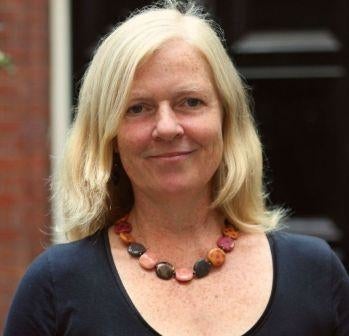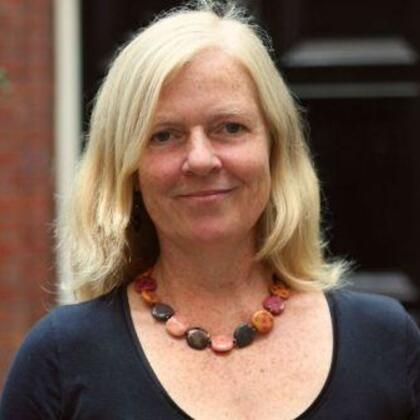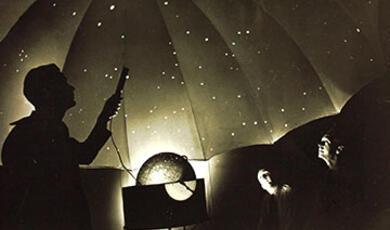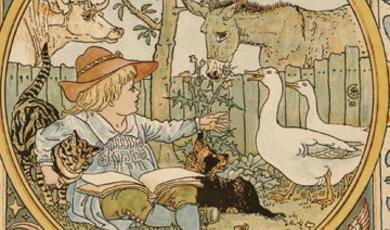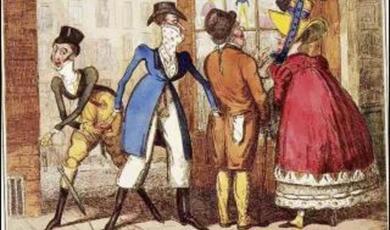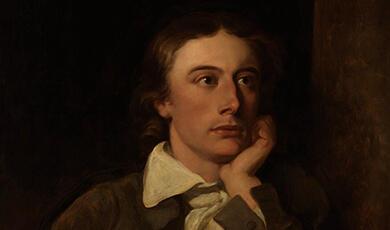Theatre and The Family: Anton Chekhov, 'The Cherry Orchard'
Share
- Details
- Text
- Audio
- Downloads
- Extra Reading
Like Plath, trees were of great importance to Chekhov. Some have described him as the first ecological writer of the twentieth century. The Cherry Orchard is Chekhov's last play. It opened at the Moscow Art Theatre on 17 January 1904. The first production rendered it as a tragedy but Chekhov had intended it to be a comedy.
An aristocratic Russian woman and her family return to their family estate (which includes a magnificent cherry orchard) before the auction that is about to be held to pay off the mortgage. Although there are various ways in which the estate might be saved, the family behaves ineffectually and the play closes with the sale of the estate to the son of a former serf. As the family leaves, the felling of the cherry orchard can be heard.
The play treats the failure of the impotent aristocracy to maintain the status quo and the bourgeoisie's naive attempts to find meaning in material acquisitiveness. But it is also about the tragicomedy of the family, whatever its class, as a social unit and microcosm of society.
Download Text
23 February 2016
Theatre and The Family:
Anton Chekhov, The Cherry Orchard
Professor Belinda Jack
Music – Tchaikovsky - https://www.youtube.com/watch?v=7ABGZhFsXYI;
Four Seasons, April/Spring (Vladimir Ashkenazy)
Good evening and welcome – and thank you for coming. Particularly good to see some familiar faces from previous lectures and particularly my last lecture on Ibsen's A Doll's House as this evening's lecture is something of a companion piece.
This extraordinary play poses two particularly intriguing questions. The first is this: how does it hold our attention given the limited amount of action? And the second: is it really a comedy as the playwright himself insisted it was? Jean-Louis Barrault, the French actor and director, summarizes the action of The Cherry Orchard in the following way: 'In Act One, the cherry orchard is in danger of being sold, in Act Two it is on the verge of being sold, in Act Three it is sold, and in Act Four it has been sold' (Laurence Senelick Anton Chekhov, 1985, 124-25)
Thus described the play seems devoid of dramatic action. The felling of the Orchard, which is arguably the dramatic climax of the play, takes place off-stage. We only hear the axe as it meets the trunk of the first cherry tree. How could the scenario described by Barrault be construed as 'comic'?
Many of you will know the play but in case some of you do not, this is a slightly fuller description than Barrault's. The play opens at first light in the nursery of the family home in rural Russia. Gayev (Ranyevskaya's brother), Varya (Ranyevskaya's adopted daughter – we never learn in what circumstances she was adopted), and Simeonov-Pishchik (a neighbouring land-owner), have gone to the station to meet Ranyevskaya who is returning from five years in Menton and Paris. The trip was motivated by a double-bereavement of her husband and seven-year old son who drowned. Her Russian lover followed her to France but has since abandoned her. Anya, her daughter, and her eccentric governess Charlotta, have travelled to Paris to bring her home.
Here's is the opening scene:
https://www.youtube.com/watch?v=CtrbZx6AOxQ
In her absence the estate has been poorly managed by Gayev (Ranyevskaya's feckless brother), who has a passion for billiards and boiled sweets. These come to suggest his infantilism. He has never, it seems, grown up. He enjoys 'play' and sucking sweets, which he often resorts to if he feels emotional. For example, he starts sucking one immediately after announcing that the nurse has died while Ranyevskaya was in France. Freud suggested that there were five stages of human development. The first is the oral. According to Freud's scheme, Gayev is stuck in the first phase.
So the extended family re-congregate at the family estate which includes a large and famous cherry orchard. The estate is about to be auctioned to pay off the mortgage. While presented with various business plans which would be likely to save the estate, the family turns in on itself, reminisces and essentially does nothing. The play ends with the sale of the estate to the son of a former serf and the family leaves hearing the sound of the cherry orchard as the felling begins.
Clip from the play:
https://www.youtube.com/watch?v=R1VzxuQZEN4
In one sense the play is about the futile attempts – or paralysis - of the aristocracy to maintain its status. While exploring the socio-economic forces at work in Russia at the turn of the 20th century, including the rise of the middle class after the abolition of serfdom in the mid-19th century, the play replicates changes occurring around the world at the time.
The Cherry Orchard was first staged, in 1904, by the Moscow Art Theatre in its new premises (where it remains today). Chekhov was terminally ill and struggling to work at all. In the circumstances it is perhaps surprising that Chekhov had written that The Cherry Orchard was I quote, 'a comedy… even in places, a farce.' [Bloomsbury, Chekhov, The Cherry Orchard (hereafter TCO), p.xxii] [That said some of the greatest comic writers suffered from melancholia. I am thinking particularly of Edward Lear and his wonderful so-called 'nonsense poetry'; 'The Owl and the Pussycat' is perhaps the most famous.]
The producer was Konstantin Sergeyevich Stanislavsky (1863 – 1938), an actor and celebrated and innovative theatre director. The Stanislavsky system would inspire numerous acting teachers around the world, influencing both stage and screen acting particularly after World War II.
Stanislavsky treated theatre-making as a rigorous discipline requiring self-analysis and self-reflection. His theory of acting stressed practice as a mode of inquiry and theory as a stimulus for creative development. He is generally considered one of the great modern theatre practitioners. And the creative partnership – however fraught at times – between Chekhov and Stanislavsky was such that it is unimaginable that a producer would stage the play today without considering the Stanislavsky method.
Stanislavsky – and other members of the cast – had been moved to tears reading it through for the first time and Stanislavsky insisted that Chekhov hadn't understood what he'd written – it was, he insisted, a tragedy. In the writing the play changed considerably but Chekhov continued to insist that it was a 'vaudeville'. On the title page of the published play he designated it a, 'comedy', and in contemporary correspondence he referred to it as, 'not a drama but a comedy, in places even a farce…' 'The last act will be cheerful – in fact the whole play will be cheerful and frivolous…'. But Stanislavsky was wholly unconvinced: 'It's not a comedy; it's not a farce… It's a tragedy… I wept like a woman. I tried to stop myself, but I couldn't. I can hear you saying, "Excuse me but it is a farce…" No, for the plain man it is a tragedy.' [TCO p.li]
So who was right?
As I stressed in my last lecture on Ibsen's The Dolls' House we need to distinguish between a play and theatre. The play can, I believe, be produced so as to emphasise its tragic dimension, or it can be brought to life as a marvellously comic event, albeit one tinged with what we might call the 'tragi-comic'.
In order to consider how the play can be made to emphasise the comic it's worth considering some theories of what constitutes the comic. Philosophers have had remarkably little to say about humour. From ancient times on, the most famous philosophers have rarely produced more than an essay. The most that major philosophers like Plato, Hobbes, and Kant wrote about laughter was a few paragraphs within a discussion of another topic. Only a few lesser-known eighteenth-century thinkers such as Frances Hutcheson (8 August 1694 – 8 August 1746, an Ulster born Scots Presbyterian minister and writer) and James Beattie (25 October 1735 – 18 August 1803) a Scottish poet, moralist, and philosopher, wrote that much. [Not the premier league footballer]
But back to humour. The word was not used in its current sense of funniness until the 18th century, and so earlier discussions were about 'laughter' or 'comedy'. The French theorist [6] Henri Bergson's 1900 Le rire: essaie sur la signification du comique (Laughter: An Essay on the Meaning of the Comic) was the first book by a notable philosopher on humour as we understand the term today. Bergson (1859 – 1941) was the major proponent of a theory known as the 'incongruity theory' of humour which built on work by James Beattie and, to a lesser extent, writings by Immanuel Kant, Arthur Schopenhauer, Søren Kierkegaard, and later philosophers and psychologists. It is now the dominant theory of humour in philosophy and psychology. Other theories which are worth brief mention are the 'superiority theory' and the 'relief theory'. The former accounts for humour's bad reputation as it asserts that we laugh at the misfortunes of others as it gives us a satisfying sense of superiority. This theory can be traced back to Plato, Aristotle, and Hobbes. In the Christian tradition humour is inextricably linked to mockery which is deemed uncharitable. The 'Relief Theory' claims that laughter is a homeostatic mechanism that reduces psychological tension caused, for example, by fear.
It was Bergson who rescued humour from its somewhat despised image. He was a major French philosopher, influential especially in the first half of the 20th century. Bergson convinced many thinkers that the processes of immediate experience and intuition are more significant than abstract rationalism or science for our understanding of reality.
In Laughter: An Essay on the Meaning of the Comic, Bergson developed a theory not so much of laughter itself, but of what provokes laughter.
He describes laughter, particularly that excited by comics and clowns, as the caricature of what he calls the 'mechanism nature' of humans (as manifest in habits, automatic acts, etc.). This is one of Bergson's two propensities of life (one is degradation towards inert matter and mechanism - and the other, the continual creation of new forms).
So one interpretation of the play - as text - which brings out its comic dimension is that the characters fail to act in a flexible way; they remain insensitive to the context in which they find themselves. They cannot give up their comfortable habits and continue to live automatically, apparently blind to the dramatically changed circumstances in which they find themselves. Ranyevskaya and Gayev refuse to adapt to the inevitable. This is, in effect, infantile behaviour: they lack adult perspective and adult 'coping strategies'. This makes them laughable.
Of course you could argue that the comedy in the play arises out of our feelings of superiority. Trofimov, the eternal student, at one point claims that he is 'above love'. Trofimov is the socialist, even revolutionary, but he too takes things to an absurd and exaggerated extreme, like a stubborn child unwilling to lose an argument.
What I would like to argue is that there is an ambiguity and subtlety about the potential for generating a sense of superiority that means that other feelings are also aroused – those of empathy. [Bergson - 8] We recognise that the characters' behaviour is inappropriate in terms of their age or in terms of the relationships they are in but we recognise our own behaviour in theirs. Take the early scene when Ranyevskaya announces her happiness seeing her nursery again after her years in France:
Ranyevskaya: The nursery. My own dear room, my lovely room... I slept in here when I was a little girl. (weeps) And now I'm like a little girl again... (kisses her brother, then, Varya, then her brother once more.) And Varya's just the same as before - she looks like a nun. And Dunyasha I recognize... (kisses her). (p.4)
…and her delight is almost intoxicating:
Ranyevskaya: Is this really me sitting here? (laughs). I feel like leaping in the air and waving my arms about. (covers her face with her hands). Perhaps it's all a dream. Oh, but I love my country, God knows I do, I love it tenderly. I couldn't look out of the carriage window - I did nothing but weep. (on the verge of tears) However, the coffee has to be drunk. Thank you Firs, thank you, my dear. I'm so glad that you are still alive. (p.9)
We may laugh at the characters in the play but their willingness to behave ridiculously forces us to recognise fellow feeling. Now, Barrault's description of the play is deliberately droll, even ironic. In one sense the play is devoid of drama; in another it is charged with psychological and emotional drama. This, as he knew well, arises not as a function of action, but rather as a function of the non-action that results from a particular set of relationships at a particular moment in Russian history – sometime after the emancipation of the serfs. Freedom, albeit of a very limited sort, was given to the peasantry in 1861, the year after Chekhov was born. In his short stories he is concerned above all with the poor and disenfranchised. In his plays, by contrast, his interest is in the impoverished gentrified residents of dilapidated country estates. The drama in The Cherry Orchard centres on how Ranyevskaya and her extended family cope – or fail to cope – with change.
I would now like to consider the role of the family in the play in relation to Bergson's idea of humour resulting from inflexibility. In my last lecture I considered the notion of the individual in Ibsen's play, A Doll's House. The play created an outrage because it ends with the play's principal female character, Nora, abandoning her husband and children in order, in contemporary language, 'to find herself'. In relation to 'duty', her husband, Helmer, declares, 'First and foremost, you are a wife and mother'. Nora replies, 'That I don't believe any more. I believe that first and foremost I am an individual, just as you are – or at least I'm going to try to be.' Tonight we're exploring the social group constituted by the family.
The family is a social unit that allows for the exploration of a large number of important correlatives (or related subjects): legitimacy and illegitimacy (might Varya, Ranyevskaya's adopted daughter be an illegitimate daughter?), and heredity (do we see parallels in the behaviour of Ranyevskaya and her brother, Gayev?). The family estate, had it been properly managed, would represent accumulated capital. It represents social status. The family also allows for an exploration of the generations and these intersect with class. The old-fashioned servant Firs treats Gayev, his master, as though he were a child. This is a reversal of the patriarchal traditions of earlier Russian literature, where the landowner was depicted as father and the servants as his children. Firs makes the final speech of the play saying, 'When will these young people learn?'' Both Gayev and Ranyevskaya are, of course, in late middle age. The play begins and ends in the nursery and this is, arguably, the heart of the home, where children, mothers (and occasionally fathers), and servants meet.
It is the existence of the extended family and the mutual support that it provides that accounts, to some extent, for the fact that the characters have failed to grow up. Russian writers have had interesting things to say about childhood and delayed development. Tolstoy, for example, claimed, 'One of the chief causes of the faults of our upper classes is the fact that it takes us so long to get accustomed to the thought that we are grown up. Our entire life till the age of 25 and sometimes even older contradicts this thought.' (quoted by 'What's so Funny about Losing One's Estate, or Infantilism in "The Cherry Orchard" Svetlana Evdokimova, , 'What's so Funny about Losing One's Estate, or Infantilism in "The Cherry Orchard" (The Slavic and East European Journal, Vol. 44, No. 4 (Winter, 2000), pp. 623-648). And Pushkin wrote something not dissimilar, "Only the fool does not change," insists Pushkin, "for time does not bring him any development, and experience does not exist for him" (my emphasis; quoted by Evdokimova).
The critic Svetlana Evdokimova makes the following astute observation:
'The timeless harmony of the nursery, as it is portrayed in Tolstoy, grows into an alarming symbol of human infantilism and the inability to confront the reality of historical as opposed to cyclic time, the reality of change as opposed to the eternal return... It is hardly a coincidence that all three major male characters in the play - the "eternal suckling" Gayev, the "eternal student" Trofimov, and the "eternal suitor" Lopakhin--are not married and have no children. As different as these characters may be, they all cling to their puerile identities and refuse to confront the demands of the adult age. Although Lopakhin arguably may seem to be the only "realistic" and "adult" character who warns his friends about the necessity of confronting the change, his purchase of the estate reveals his fixation on childhood as well. After all, Lopakhin buys the cherry orchard neither for aesthetic nor for practical reasons. Rather, the purchase of the estate represents his desperate and misguided attempt to cope with his traumatic and deprived childhood and to resolve his Oedipus-complex. It is to the male domineering figures of his father and grandfather that he ultimately addresses his drunken speech upon the purchase of the estate: [9; Beijing production, 2014]
'The cherry orchard's mine now! Mine! (Laughs.) Lord! My God, the cherry orchard is mine! . . . (Stamps his feet.) Don't laugh at me! If my father and my grandfather could rise from their graves and see everything that has happened--how their Yermolay, their often flogged and half-literate Yermolay, who used to run about barefoot in the winter, how that very Yermolay has bought the most magnificent estate in the world! I bought the estate where my father and grandfather were serfs, where they were not even admitted to the kitchen! I am asleep, I am only day-dreaming, I only imagine it. ...'
Here Lopakhin, in his infantile way, considers that he has entered the Garden of Eden from which the others have now been banished. As Stephen Baehr points out:
One axis of Chekhov's play stresses - at least on the surface - the idea of a Russian "paradise lost," depicting the "Fall" of the old nobility from their Edenic existence in the Garden of Cherries. In several earlier short stories, Chekhov had ironically compared this estate world of the nobility with the Garden of Eden and introduced motifs of the Fall; some of this irony continues in The Cherry Orchard, where, as we shall see, the "paradise" of one class is built upon the sweat and toil of another. (Stephen L. Baehr, 'The Machine in Chekhov's Garden: Progress and Pastoral in the Cherry Orchard', The Slavic and East European Journal, Vol. 43, No. 1 (Spring, 1999), pp. 99-121
It is this political aspect of the play that the director Howard Davies wanted to focus on in his brilliant National Theatre production of Andrew Upton's adaptation of The Cherry Orchard in 2011. This clip offers an insight into the production, the world of the play created by designer Bunny Christie and Zoë Wanamaker's thoughts on playing Ranyevskaya.
Promotional Video:
http://www.nationaltheatre.org.uk/video/an-introduction-to-the-cherry-orchard
For most of Chekhov's life, theatre was a frustration and a constant source of self-doubt. He claimed that theatre bored him and described it as 'the venereal disease of the cities'.
And his struggles to understand the potential of theatre changed forever what it was and could be. And what finally accounted for his success was, I think, his capacity to master ambiguity. This derives in part from what critics have termed the 'colourlessness' of his language. We understand Chekhov's words but we don't dwell on them. His other great skill was in detaching himself so fully from his characters. The critic Magashack has argued that 'in all his plays Chekhov gives expression to his social and political views by putting them into the mouths of his characters'. In a letter he wrote to Alexei Pleshcheyev... (he had spent ten years in Siberia for his political activities): 'The people I fear... are those who seek to read tendencies into what one writes, and who want to see me as straightforwardly liberal or conservative. I am not a liberal – not a conservative – not a gradualist – not a monk – not an indifferentist. I should like to be a free artist and nothing else, and I regret that God has not given me the power to be one. I hate lies and violence in all their forms... Pharisaism, stupidity, and arbitrariness reign not only in jails and merchants' houses; I see them in science, in literature and among young people... That's why I nourish no particular predilection for security policemen or butchers or scholars or writers or young people. Signs and labels I account mere prejudice. My holy of holies is the human body, health, intelligence, talent, inspiration, love, and the most absolute freedom, freedom from force and lies, in whatever form these last two might be expressed. That is the programme to which I should adhere were I a major artist.'
And he argued:
'The artist must not be the judge of his characters and what they are talking about, but merely an impartial witness. I heard a confused conversation, resolving nothing, between two Russian people about pessimism, and I have to pass on this conversation in the same form in which I heard it, but it will be evaluated by the jury, i.e., the readers. My job is merely to be talented, i.e., to be able to distinguish important phenomena from unimportant, to be able to illuminate characters and speak with their tongue.'
Part of what Chekhov wanted when he underlined the comic aspect of his plays was a new style of acting – one that was light, speedy and open to irony. He did not want to convey the hopeless workings of fate but absurdity and meaninglessness. The former would be tragic. And the idealism of tragedy was something that might have struck him as elitist. The people who matter in tragedy are the powerful - kings, queens, and military chiefs. In comedy, on the other hand, there are more characters and they are often on a par socially. But equally, there are more kinds of characters, women tend to feature more, and many of the principal roles are characters who belong to the lower classes. Yet everybody counts. And in comedy, as opposed to tragedy, the language is common speech, not elevated and remote. The basic unit in tragedy is the individual, in comedy it is the family or group. The heroes of tragedy are preoccupied by their predicament whereas comic characters are emotionally distanced from real events.
In Chekhov the characters are distanced from real events by their immaturity and childishness. But it is equally their childishness which can make his characters so appealing. In The Cherry Orchard, Chekhov blends comedy with social satire so that we laugh both at and with his cast. We feel a mix of sympathy and frustration towards these eternal youths who simply won't grow up. None of The Cherry Orchard's characters (including Lopakhin) seems capable of growth. And this we can easily read as an allegory of Russia's inability to develop national selfhood. National nostalgia for an earlier golden age (equated with childhood), a continuing desire for the safety of patriarchal relations (analogous to those of the family), and the comfort of the real extended family, all combine to create an overwhelming sense of what we now call 'arrested development' [The American sit-com of the same name is about a formerly wealthy and habitually dysfunctional family; contemporary American take on Chekhov's play]
Chekhov's capacity to make us laugh at his characters' infantilism encourages us towards growth and an adult sense of responsibility. As Svetlana Evdokimova writes, 'By laughing at the characters' lack of maturity, we become more mature our-selves, for, as was suggested by Freud in his discussion of the functions of humour, a good sense of humour is an essential component of maturity.' Recent research in the field of cognitive development has confirmed Freud's claims.
I wonder what Chekhov would make of what's going on in the world today and President Putin's involvement in things. He would have deplored the widespread violence. And he might have deemed the behaviour of many in power as infantile in their shows of superiority and belligerence. Whether or not the superpowers can grow up and make the world a safer and fairer place can only be a matter of speculation. But those of us fortunate enough to see a good production of The Cherry Orchard, we will, I think, go home that little bit wiser – and that little bit more grown up.
Music – Stravinsky's Rite of Spring
© Professor Belinda Jack, 2016
This event was on Tue, 23 Feb 2016
Support Gresham
Gresham College has offered an outstanding education to the public free of charge for over 400 years. Today, Gresham College plays an important role in fostering a love of learning and a greater understanding of ourselves and the world around us. Your donation will help to widen our reach and to broaden our audience, allowing more people to benefit from a high-quality education from some of the brightest minds.


 Login
Login
